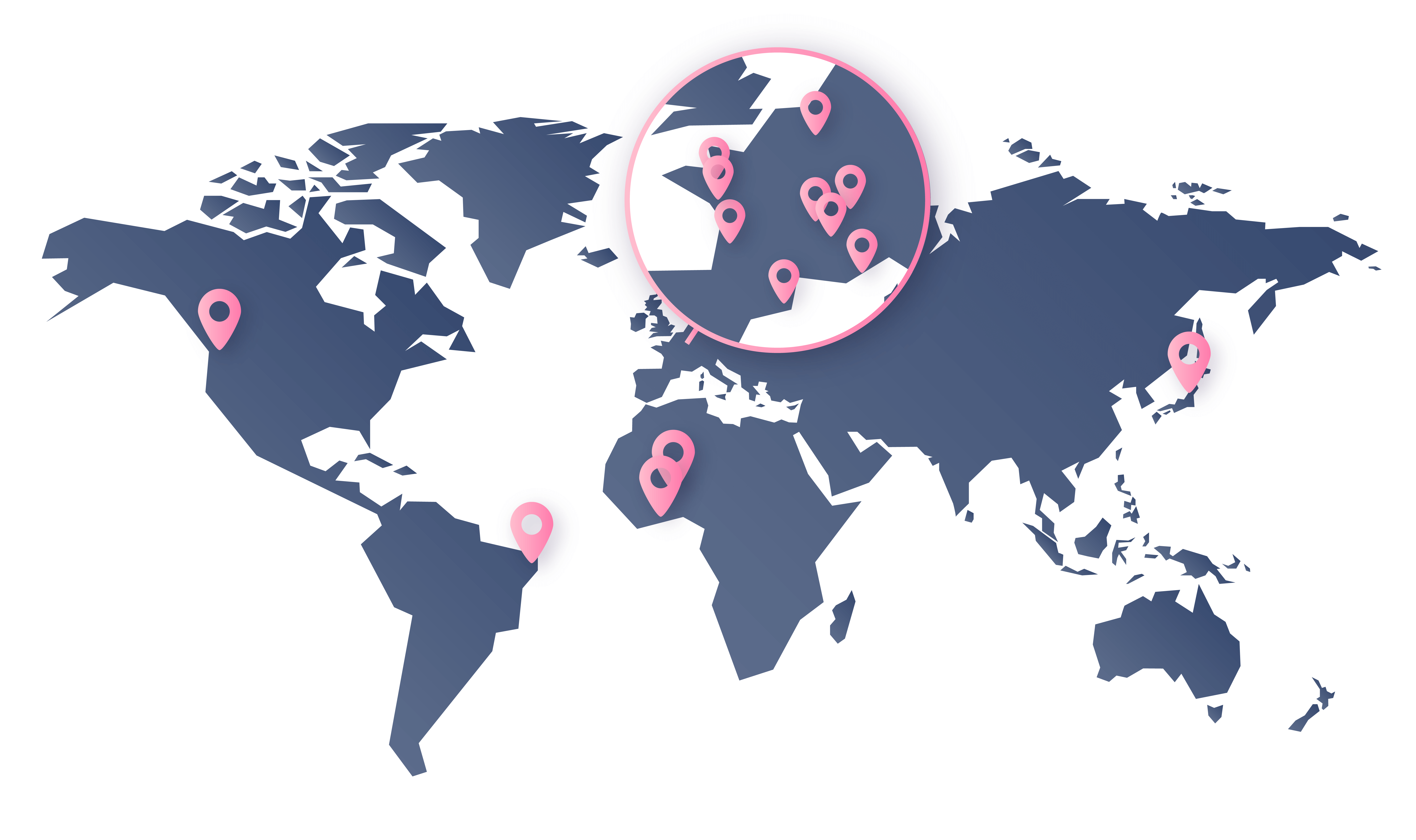CITIES & MENTAL WELLBEING INTERNATIONAL SYMPOSIUM
Mental health disorders are the second most common cause of disability in the world, reducing life expectancy of sufferers and causing a significant direct or indirect economic burden. Although such disorders are still not sufficiently covered by research, they remain an essential issue when it comes to medical care, social and professional inclusion and removing stigma.
The health crisis at least had the merit of emphasising the importance of a greater focus on mental health problems and pushing us to reflect more on the living conditions of citizens in functional, inclusive and sustainable cities, as our societies are built around metropolitan areas that concentrate populations and wealth. Researchers show that city dwellers are more likely to develop psychological and psychiatric disorders, depending on the neighbourhoods where they live and their characteristics.
Cities offer many opportunities to improve the mental health of their population, particularly by focusing on sustainable development, offering peaceful green havens, developing cultural and sporting activities or tackling inequality.
Diverse cultural life, access to public transport, proximity of public services and employment prospects offer genuine opportunities to define “Mental-Health-Friendly Cities”. Urban areas and metropolises are therefore a fabulous laboratory with multiple levers for improving the mental health of their population. The objective of this conference is to demonstrate that while emphasising the need for early detection and preventive measures.
Mental health is also the concern of the Cities:

Download the Nantes Call to Action
-

Johanna ROLLAND
Mayor of Nantes and President of Nantes Metropole
Rethinking and bridging connections between individual suffering and collective initiatives
Nantes is proud to host this international Conference on 1 and 2 December. The event will attempt to answer a crucial question: How can towns and cities contribute to the mental health of citizens?
This is something we are naturally asking ourselves in our city, like everywhere else in France and throughout the world, in different regions, provinces, and States. Mental health is clearly an issue that knows no geographical or intellectual boundaries. On the contrary, it compels us to ensure that expertise and opinions are shared as widely as possible. We need to extend mental health beyond the specialist spheres to which it is usually confined, to raise awareness among regional players. We also need to take more concrete initiatives to deal with all these issues which are still, unfortunately, too often taboo subjects.
The ambitious challenge and purpose of this interdisciplinary Conference is to take two days of explore different approaches and experiences on an international level. Attendees will be encouraged to rethink and bridge connections between individual suffering and collective initiatives.
Mental health is a societal issue, a question for our time and a future challenge for all populated regions of the world. We now know that environments, work organisations, and key socio-economic determinants such as education and income are crucial to mental health and well-being. Difficulties in accessing employment or housing, or giving up on healthcare, can aggravate isolation, social exclusion, and mental health problems. In addition, the health crisis we are experiencing has significantly worsened and accentuated some of these issues.
There is therefore an urgent need to encourage debate so that mental health does not remain confined to the medical and healthcare sectors. In particular, we need to develop our understanding of the social, health and urban challenges of mental health to grasp, for example, how cities, through their organisational system, amenities, spaces for expression and public debate, and social, cultural and sports activities alter or encourage the well-being and mental health of those who live there. The 2019 Copenhagen Consensus Statement, focused on achieving greater happiness in cities, is a clear sign of this commitment to step up health-related initiatives, so that health becomes a transversal topic for all public policies.
This all-encompassing positive approach to health echoes our political project here in Nantes, with a focus on social ecology and 360° health. This is how I see my responsibility as an elected representative, with the desire to support quality infrastructure projects, such as the future University Hospital of the 21st century that will be created here. This approach, however, also raises the question of the recognition of health and care professions, in their great diversity and richness, which requires national responses, with additional resources from the State, in particular to support and accompany all the actors in psychiatry and, more generally, in mental health, in line with today’s needs.
As Mayor of the 6th-largest city in France, President of Nantes Métropole and President of France urbaine, I know that we still have a long way to go to guarantee truly inclusive health and open, hospitable localities, taking responsibility for the mental health of the future. We need to pursue ambitious policies that make well-being a true indicator of the quality of life in our cities. This conference will contribute to that ambition, and I hope that all the participants and speakers will have fruitful discussions to help us make better political decisions at local level in the future.
Very early on, Nantes realised the importance of “democratising” health. It was one of the first local authorities in France to sign a Local Health Contract and has made strong commitments, particularly regarding mental health, access to healthcare for the most vulnerable groups and prevention of risky behaviour among young people.
Proactive political choices were made, such as maintaining a systematic health check-up in the last year of nursery school and in the third year of primary school in order to take into account the overall health of children, or encouraging the establishment of reception facilities such as mutual aid groups run by people with mental disabilities, to allow them to find their place in the city and to fully express their citizenship.
In 2019, Nantes also opened the first centre in France dedicated to female victims of violence and their children. The centre is open 24 hours a day and 7 days a week. It takes into account the suffering of children, who are co-victims, and offers comprehensive support to women suffering from post-traumatic stress, particularly as a result of repeated physical or sexual violence.
To provide an environment conducive to health and quality of life, Nantes has also adopted a Local Environmental Health Action Plan and has signed the Charter for Cities and Territories without Endocrine Disruptors. After winning the European Green Capital Award in 2013, Nantes finally become the European Capital of Innovation in 2019, in particular to recognise all the steps taken to encourage dialogue with citizens and joint creation of the city of tomorrow.
The City of Nantes, which has become vice-president of the French WHO Healthy Cities Network, is an active member of the same network at European level.
-

Doctor Rachel BOCHER
Scientific Curator of the event
There can be no health without mental health
Mental health disorders (anxiety, non-characterised depressive episodes) and psychiatric disorders (depression, addictions, behavioural disorders, bipolarity, etc.) rank third among the most recurrent ailments, after cancers and cardiovascular problems, according to the WHO: one person in four will be confronted with such disorders during their lives.
While we all have a good idea of what physical health entails, mental health is much less clear. But the two are related. People who are depressed, for example, are 30% less likely to have good cardiovascular health. The lack of treatment for mental disorders is therefore all the more damaging (40% to 60% of people who suffer the consequences are not treated, according to the French Federation of Mutual Insurers Mutualité française).
Hence the urgent need to take action early on and develop a mental health culture to prevent, identify at the earliest possible stage, and develop awareness-raising activities, particularly among young people, to reduce the stigma attached to mental disorders, which are still taboo subjects. Of course, we need to reinforce actions on detection and access to care, and strengthen research, but we also need to take more interest in and act on prevention and on the overall determinants of mental health.
There can be no city without mental health
Because mental health is the cornerstone of individual well-being but also the basis for good collective functioning, it must be placed at the heart of public policies. Mental health is a state that varies according to personal factors (our life experience or our genetic heritage for example), but it is also a state that is very sensitive to external factors (environment, housing or employment for example). Here again, the two interact: good mental health is beneficial to individuals in order to better fulfil themselves, cope with the normal tensions of life and do productive work, thereby contributing to the life of their communities.
The onus is therefore on communities to consider mental health as a resource that can deteriorate through exposure to socio-environmental factors such as isolation, reduced sociability, lack of resources or physical exercise, blurring of the lines between personal and professional life, etc., all of which were exacerbated during the pandemic. Nearly one in five adults (17%) in France showed signs of a depressive state, and nearly one in four (23%) reported an anxious state, according to figures from the French Health Agency Santé publique France. That represents an increase of almost 70%. Younger people, women and people in precarious situations were particularly affected. In fact, this situation is not new. The pandemic simply served to reveal a situation that professionals were already familiar with: the weaknesses of mental health promotion and of prevention of psychological disorders in France.
The aim of this conference is to bring the subject out into the open, beyond the realm of experts, to demonstrate that mental health is determined by a multitude of socio-economic, biological and environmental factors and that there are promising intersectoral strategies and interventions at the level of cities, i.e. the places where we live, to promote, protect and recover mental health.
PARTNER CITIES
The programme of the international “Cities & Mental Health” conference will bring together a panel of leading figures in the field of health, experts with various profiles (scientists, urban planners, architects, anthropologists, etc.) but also international elected officials with a long-standing commitment to proactive health policies, who are keen to present their local actions to improve the mental health of their inhabitants.

-

Abidjan
-

Annecy
-

Barcelone
-

Bordeaux
-

Cannes
-

Dunkerque
-

Grenoble
-

Lausanne
-

Lyon
-

Namur
-

Nantes
-

Niigata
-

Ouagadougou
-

Recife
-

Rennes
-

Seattle
REGISTRATION AVAILABLE !
The three-day Conference aims to reduce stigma, remove barriers, inspire and raise awareness about Cities and Mental Health through presentations by international specialists, round-table discussions and art.

Documentary resources
-

Plateforme 10: Lausanne’s new cultural district
-

School Streets: rapidly-growing schemes
-

The House of Women: a unique facility for women victims of violence
























